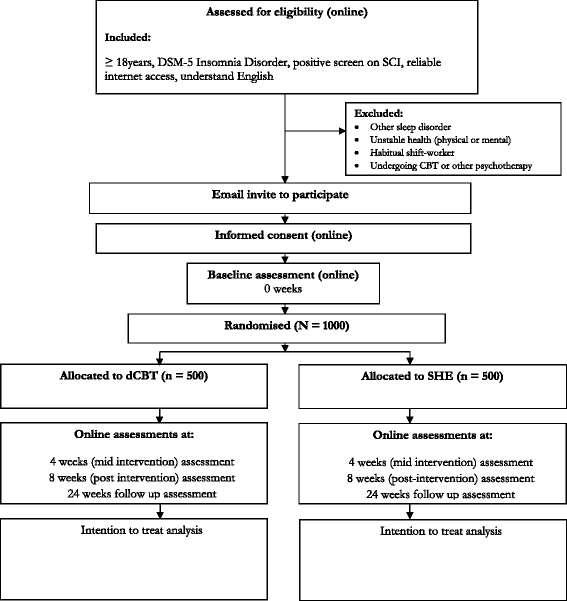Digital Cognitive Behavioural Therapy for Insomnia versus sleep hygiene education: the impact of improved sleep on functional health, quality of life and psychological well-being. Study protocol for a randomised controlled trial
- PMID: 27216112
- PMCID: PMC4877942
- DOI: 10.1186/s13063-016-1364-7
Digital Cognitive Behavioural Therapy for Insomnia versus sleep hygiene education: the impact of improved sleep on functional health, quality of life and psychological well-being. Study protocol for a randomised controlled trial
Abstract
Background: Previous research has demonstrated that digital CBT (dCBT), delivered via the Internet, is a scalable and effective intervention for treating insomnia in otherwise healthy adults and leads to significant improvements in primary outcomes relating to sleep. The majority of people with insomnia, however, seek help because of the functional impact and daytime consequences of poor sleep, not because of sleep discontinuity per se. Although some secondary analyses suggest that dCBT may have wider health benefits, no adequately powered study has investigated these as a primary endpoint. This study specifically aims to investigate the impact of dCBT for insomnia upon health and well-being, and will investigate sleep-related changes as mediating factors.
Methods/design: We propose a pragmatic, parallel-group, randomised controlled trial of 1000 community participants meeting criteria for insomnia disorder. In the DIALS trial (Digital Insomnia therapy to Assist your Life as well as your Sleep), participants will be randomised to dCBT delivered using web and/or mobile channels (in addition to treatment as usual (TAU)) or to sleep hygiene education (SHE), comprising a website plus a downloadable booklet (in addition to TAU). Online assessments will take place at 0 (baseline), 4 (mid-treatment), 8 (post-treatment), and 24 (follow-up) weeks. At week 25 all participants allocated to SHE will be offered dCBT, at which point the controlled element of the trial will be complete. Naturalistic follow-up will be invited at weeks 36 and 48. Primary outcomes are functional health and well-being at 8 weeks. Secondary outcomes are mood, fatigue, sleepiness, cognitive function, productivity and social functioning. All main analyses will be carried out at the end of the final controlled follow-up assessments and will be based on the intention-to-treat principle. Further analyses will determine whether observed changes in functional health and well-being are mediated by changes in sleep. The trial is funded by Big Health Ltd.
Discussion: This study will be the first large-scale, specifically designed investigation of the health and well-being benefits of CBT for insomnia, and the first examination of the association between CBT-mediated sleep improvement and health status.
Trial registration: ISRCTN60530898 .
Keywords: CBT; Digital; Function; Health; Insomnia; Sleep; well-being.
Figures
References
-
- American Psychiatric Association . Diagnostic and statistical manual of mental disorders. 5. Washington: American Psychiatric Association; 2013.
-
- Lichstein KL, Durrence HH, Reidel BW, et al. The epidemiology of sleep: age, gender and ethnicity. Mahwah: Lawrence Erlbaum Associates; 2004.
-
- Morphy H, Dunn KM, Lewis M, et al. Epidemiology of insomnia: a longitudinal study in a UK Population. Sleep. 2007;30(3):274–80. - PubMed
MeSH terms
Associated data
Grants and funding
LinkOut - more resources
Full Text Sources
Other Literature Sources
Medical


